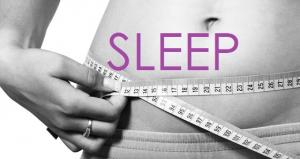emaxhealth.com. Serious weight loss involves serious lifestyle changes and it includes improving your sleep.
The research on poor sleep and obesity is ever growing. Consider the Nurses’ Health Study, a study of 60,000 women who were followed for 16 years to understand the connection between their habits and health risks.1 At study entry all of the women were healthy and none were obese. Over 16 years, women who slept 5 or less hours per night had a 30% higher risk of gaining 30 pounds compared to women who slept 7+ per night. Poor sleep can be in the form of obstructive sleep apnea or chronic insomnia. If you want to have a deeper understanding of your weight issues, know that your sleep is an important piece of the puzzle.
My colleagues and I have been examining data from our weight loss studies to see if sleep deprivation is associated with weight loss outcomes. It is. Our studies and others show that people who get insufficient sleep lose very little weight. Some of them even gain weight when they are trying to lose.
There are many reasons this may be the case:
Sleep deprivation is associated with an elevation in appetite hormones. This means you may feel hungrier and end up eating more when you are sleep deprived. Sleep deprivation messes with those internal hunger cues so even if you are doing a good job of eating only in response to your physical hunger, sleep deprivation makes you think you are hungry when you really aren’t.
Second, it is harder to get motivated to exercise when you are tired. This means more skipped workouts which ultimately means it is harder to make exercise a regular part of your life.
Third, willpower in general will be affected by low energy. When we are exhausted it’s just much harder to focus, resist temptation, plan, and achieve our goals.
Finally, sleep deprivation makes us grouchy, and we all know being in a bad mood does us no favors on the weight loss journey or any other journey for that matter.
Here are some steps to conquer your sleep issues:
1. Practice good hygiene! Sleep hygiene, that is. These are the rules for good sleep. Briefly, go to bed and wake up at the same time every day (weekends included!), avoid caffeine in the PM hours, don’t nap, get up after 20 minutes of tossing and turning, avoid alcohol before bed, and create a comfortable, dark and quiet environment in the bedroom. For even more tips check outthis post on sleep hygiene.
2. Get evaluated for sleep apnea. Many people who have sleep apnea don’t know it. Some indicators are snoring, feeling sleepy throughout the day, waking up with a dry throat, and/or waking up to a gasping/choking sensation. Keep in mind you don’t have to experience all of these to have sleep apnea and you don’t have to be “obese” per se. Sleep apnea is related not only to weight gain, but also to diabetes and heart disease. Sleep apnea is also an independent predictor of mortality from all causes.2 It is a very serious condition.
3. Remove the Badge. Sleep deprivation almost feels like a badge of honor to hard workers who sacrifice their sleep for the “to do” list, but keep in mind, it is only undermining your weight loss, not to mention your work productivity and mood. You may not realize how much better you could feel if only you were rested. Yes, you will sleep when you are dead, but not sleeping now may get you there sooner.
4. Deal with Stress. Poor sleep often happens because our minds weigh heavy. Identify the stress in your life and make a plan for dealing with it head on. Is it work? Your relationship? Family matters? Not addressing major problems and stressors in life can lead to a longstanding pattern of insomnia that can really impact your health.
5. Exercise. A regular habit of aerobic exercise will not only help to reduce your stress but also improve your sleep. One study showed that sedentary women with insomnia who were asked to exercise 3-4 times per week ended up increasing their sleep by 45 minutes per night and had fewer wake ups than a group who was simply given information about sleep hygiene.3
If you are serious about losing weight, it really is time to do something about your sleep.
References
- 1Patel, SR, Malhotra, A., White, DP, Gottlieb, DJ, and Hu, FB. (2006) Association between reduced sleep and weight gain in women. Am J Epidemiology. 164, 947-954.
- 2Marshall, NS, Wong, KKH, Lu, PY et al (2008). Sleep Apnea as an Independent Risk Factor for All-Cause Mortality: The Busselton Health Study Sleep. 31(8), 1079-1085.
- 3Reid, KJ, Glazer Baron, K, Lu, B., Naylor, E., Wolfe, L., and Zee, P.C. (2010) Aerobic exercise improves self-reported sleep and quality of life in older adults with insomnia. Sleep Medicine, 11(9), 934-940.


























































